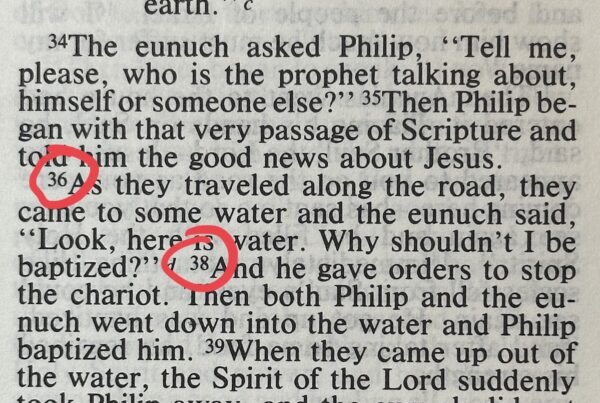Joel says, “I pray every day but I have so many doubts…. I feel like I’m going through the motions … and talking to myself [and] NOT actually talking to someone…. My mind even wonders. I try to concentrate on talking to God, but it’s hard, since I can’t physically see him or hear him.” Joel asks, “How do I concentrate on talking to God when I can’t physically see him like I can when I’m talking to a person?”
A Response:
Joel, thanks for being honest about your struggles with prayer. One major concern you raise is this: why talk to anyone who doesn’t exist? We may find ourselves talking to a loved one who has died, and that may be psychologically understandable. But if we regularly talk to non-existing entities, we may be good candidates for a mental health institution. Let’s face it: If a personal God actually exists, even if he is non-physical, it makes plenty sense to communicate with him. But if a personal and Spirit-God does not exist, let’s not waste our time.
Your first challenge, it seems to me, is to increase your conviction that a personal God truly exists. This certainly requires faith. And faith is “the assurance of things hoped for, the conviction of things not seen” Heb. 11:1 ESV). But Peter reminds us that our hope is not unfounded fantasy. He says we can “give the reason for the hope” we have (1 Pet. 3:15). Fortunately, there are many reasons to believe that the personal God of Scripture exists and that he has acted and communicated throughout human history. This God also provides the ultimate basis for meaning and morality, and his forgiveness releases us from pain of conscience that’s been produced by our sin. (See my “Home Tour” for more on all this.)
If we’re adequately convinced of God’s reality, we will become more confident that our prayers are actually heard by someone other than ourselves. I don’t mean to suggest that this is an easy or quick process. But if we focus on what God has done in nature and in history—for others and for us, we can see that this God who is Spirit (John 4:24) is indeed alive and well and worth praying to.
With that as a background, here are some biblical, psychological, and practical points that might help in your struggles with praying.
(1) Scripture clearly commands us to pray. For those who seek God, prayer is not an option. If we pray only when we feel like it, we will undoubtedly not pray enough. In part, prayer is our response to God’s command. Jesus’ parable of the persistent widow was given to show that they “should always pray and not give up” (Lk. 18:1 NIV). Paul tells us to “pray without ceasing” (1 Thess. 5:17 ESV); to “continue steadfastly in prayer” (Col. 4:2); and “in everything by prayer and supplication … let your requests be made known to God” (Phil. 4:6). The verbs in these passages are present-tense imperatives—meaning that they are commanding ongoing action. We should therefore try our best to follow God’s commands even when we don’t feel like. But admittedly, that’s tough to do! It helps to remember that God wants us to ask, so he can give us “good things” (Matt. 7:7-11).
(2) Jesus agrees with you that merely going through the motion of prayer is not acceptable. Jesus condemned those who honored God with their lips but whose hearts were far from God (Matt. 15:7-8). And he denounced those who make lengthy prayers “for a show” (Luke 20:47 NIV; Matt. 6:5-8). I commend you for acknowledging that, sometimes, you sense you’re just “saying the words.” This is actually a very good sign that you want to seek God. You rightly understand that there must be more to it.
(3) You’re not alone in your struggle to pray. It’s significant that Jesus’ own disciples asked him, “Lord, teach us to pray” (Luke 11:1). The implication is that they were having their own struggles with prayer. Jesus responded with what we call “The Lord’s Prayer” (Lk. 11:2-4; Matt. 6:9-13). This model offers direction on what we should pray.
The Lord’s Prayer steers us to express worship to the holy heavenly Father; it guides us to pray for God’s will to be done on earth (and therefore in our life); it reminds us to ask God for our physical needs; it instructs to pray for our forgiveness and for us to forgive others; it leads us to pray to escape temptation (cf. Lk. 22:40); and it trains us to ask God to deliver us from Satan’s power. That’s a pretty good list to start with and stick with. Other important topics can be generated from that.
(4) Our human weakness inescapably hampers our prayers. The fact is that we are human: we get tired; we fall asleep; we get distracted; we can’t remember what we were just talking about; we can’t focus; and so on.
This is illustrated in the Garden of Gethsemane just before Jesus’ crucifixion. As Jesus went to pray alone, he commanded three disciples to “keep awake” (Matt. 26:36-38). (Many translations say “keep watch,” but the Greek word means to stay awake and alert.) When Jesus returned, they were asleep. Essentially, he asks Peter, couldn’t you stay awake with me for one hour? (Matt. 26:40). Then Jesus says, “The spirit is willing, but the flesh is weak” (Matt. 26:41).
Jesus went away to pray a second time … and a third time. And each time, samo-samo: the disciples were asleep when he returned. That’s me; that’s you; that’s every human! Our human weaknesses impel us to fail. And this affects our prayer life. Candidly, I sometimes have a hard time staying awake and praying for one minute, much less one hour!
I say all this not to provide an excuse for poor praying, but to explain why it’s so challenging for all of us. You’re not alone!
(5) The Holy Spirit helps us pray. The great news is that God does not leave us floundering alone. The apostle Paul reveals that “the Spirit helps us in our weakness. For we do not know what to pray for as we ought, but the Spirit himself intercedes for us with groanings too deep for words” (Rom. 8:26). The Spirit can read our hearts and remake our mumbling into powerful prayer before God (Rom. 8:27).
(6) Here are several very practical tips that might help with your struggles with prayer.
- Write out specific topics to cover in your prayers. That can help keep you focused. We sometimes lose our concentration in prayer because we get lost in the vagueness of where we are and where we are going. The items mentioned above with the Lord’s Prayer can be used to start.
- Choose a passage of Scripture to prompt your prayers. For example, reading from the Psalms can really help keep your prayers more focused and effective. The Psalms will direct your prayers toward the failures you face, the challenges you encounter, the creation you observe, the forgiveness you need, and the God who saves. (See Psalm 3 as a specific example.)
- Pray out loud—even when you are alone. I’ve discovered that when I pray silently, I especially tend to lose my focus. But when I use my mouth and speak, even in a whisper, I stay better connected.
I hope these considerations and suggestions will help you and others have greater confidence and satisfaction in your communication with the God who is there.
P.S. For related articles, see the following:





